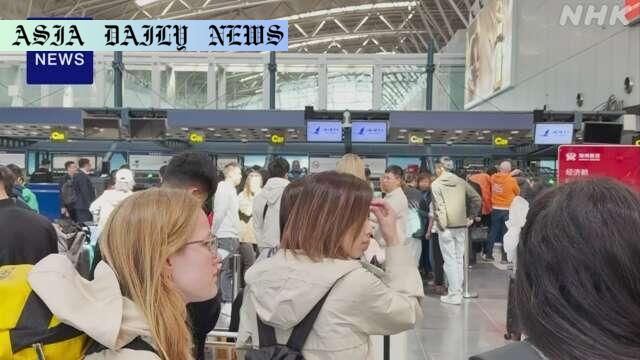Pyongyang Marathon: Participants from Over 40 Nations Return to North Korea as COVID-19 Restrictions Ease Post-Pandemic.

The Return of the Pyongyang International Marathon
In a much-anticipated turn of events, international participants have begun arriving in North Korea to compete in the Pyongyang International Marathon. Officially set for April 6, 2023, this marks the first running of the marathon since its suspension in 2019 due to the COVID-19 pandemic and strict border controls. The event is part of a broader series of celebrations honoring the April 15 birthday of Kim Il Sung, the founding father of North Korea.
The significant easing of travel restrictions by North Korea has made this possible, allowing a select number of foreign tourists back into the country. Travelers arrived from Beijing Capital International Airport via direct flights to Pyongyang, signaling a slow but potential reopening of one of the most isolated countries in the world. According to a Chinese travel agency organizing marathon tours, runners from over 40 countries and regions have registered to participate in the event, demonstrating global interest in reconnecting through sports despite previous barriers built during the pandemic.
A Sporting Event with Political Undertones
The marathon isn’t just a sporting event; it is charged with cultural and political symbolism. Taking place annually to commemorate Kim Il Sung’s birthday, events like this allow North Korea to showcase a more accessible and welcoming image to the outside world. For its part, the nation’s Ministry of Physical Culture and Sports has played a crucial role in organizing the event, emphasizing its intent to demonstrate unity and resilience amid ongoing challenges.
However, while the influx of international participants provides a moment of excitement, observers remain skeptical about whether this marathon signals a broader opening for North Korea. Despite the recent relaxation around entry controls for approved tourists, questions linger about how sustainable this newfound flexibility is and whether it marks a shift in North Korea’s tourism and foreign relations strategies. This marathon may serve as a litmus test for its plans concerning future global engagement.
Significance of the Participants’ Arrival
The sight of runners from 40+ nations landing in a country like North Korea is noteworthy. After years of near-total isolation due to the pandemic, coordinating international travel to Pyongyang signifies a major logistical and diplomatic achievement for the nation. Leveraging the marathon as a platform to attract attention globally, North Korea has strategically aimed for positive visibility as it reintroduces itself into the international sphere. The event has been embraced by various athletes and professional runners looking to explore unique experiences while contributing to this moment in sporting history.
For marathon runners, participating isn’t solely about the race; the opportunity to visit the secretive and culturally rich country likely holds as much appeal as the event itself. Such exchanges also allow foreign nationals to engage directly, even minimally, with North Korea’s people and landscapes, creating a rare and often humanizing experience within a usually closed-off system.
Potential Implications for the Future
Although the event’s return is a positive sign, whether North Korea will maintain this momentum remains unclear. Economically and socially, the country has significant reasons to increase its openness, especially concerning tourism, as many sectors struggle to recover from prolonged stagnation. The marathon and subsequent tourist arrivals could help reinvigorate these industries, provided restrictions don’t tighten once again.
From geopolitical observers’ perspectives, events like the Pyongyang International Marathon present opportunities to assess North Korea’s ongoing policies post-pandemic. The limited reopening serves as a microcosm for larger discussions about whether the country is testing international waters for increased trade, tourism, or diplomatic communication.
Commentary
The Cultural and Political Layers of the Pyongyang Marathon
The return of the Pyongyang International Marathon after a four-year hiatus is more than just a sporting event; it is a statement. While at its core it celebrates human endurance and international unity in sports, the race is deeply ingrained in North Korea’s cultural and political framework. This makes it an exceptional case in international sporting events, as it blends athleticism with the country’s strategic efforts to present itself in a favorable light globally.
Symbolism Beyond Sports
Running through the streets of Pyongyang as international participants symbolizes more than fitness—it reflects a rare moment where North Korea opens its doors to the world, albeit cautiously. The fact that participants from over 40 nations are joining speaks volumes about the global curiosity surrounding this mysterious nation. For those participating, it may very well be a once-in-a-lifetime experience, as crossing into North Korea remains a significant feat in itself, let alone racing through its capital.
Challenges in Reopening
From a critical lens, one must ask whether this is a genuine reopening or a controlled attempt to project normalcy. North Korea has long been isolated both geographically and politically, and the pandemic only amplified this. While the relaxation of travel restrictions is a step forward, the level of access is likely to remain limited, leaving room for speculation about their future policy directions.
The Pyongyang Marathon presents us with an almost paradoxical picture—a major avenue for international engagement in one of the world’s most closed-off countries. Perhaps, as history frequently demonstrates, sporting events like these can bridge divides and create dialogue, even in the most unconventional settings.


